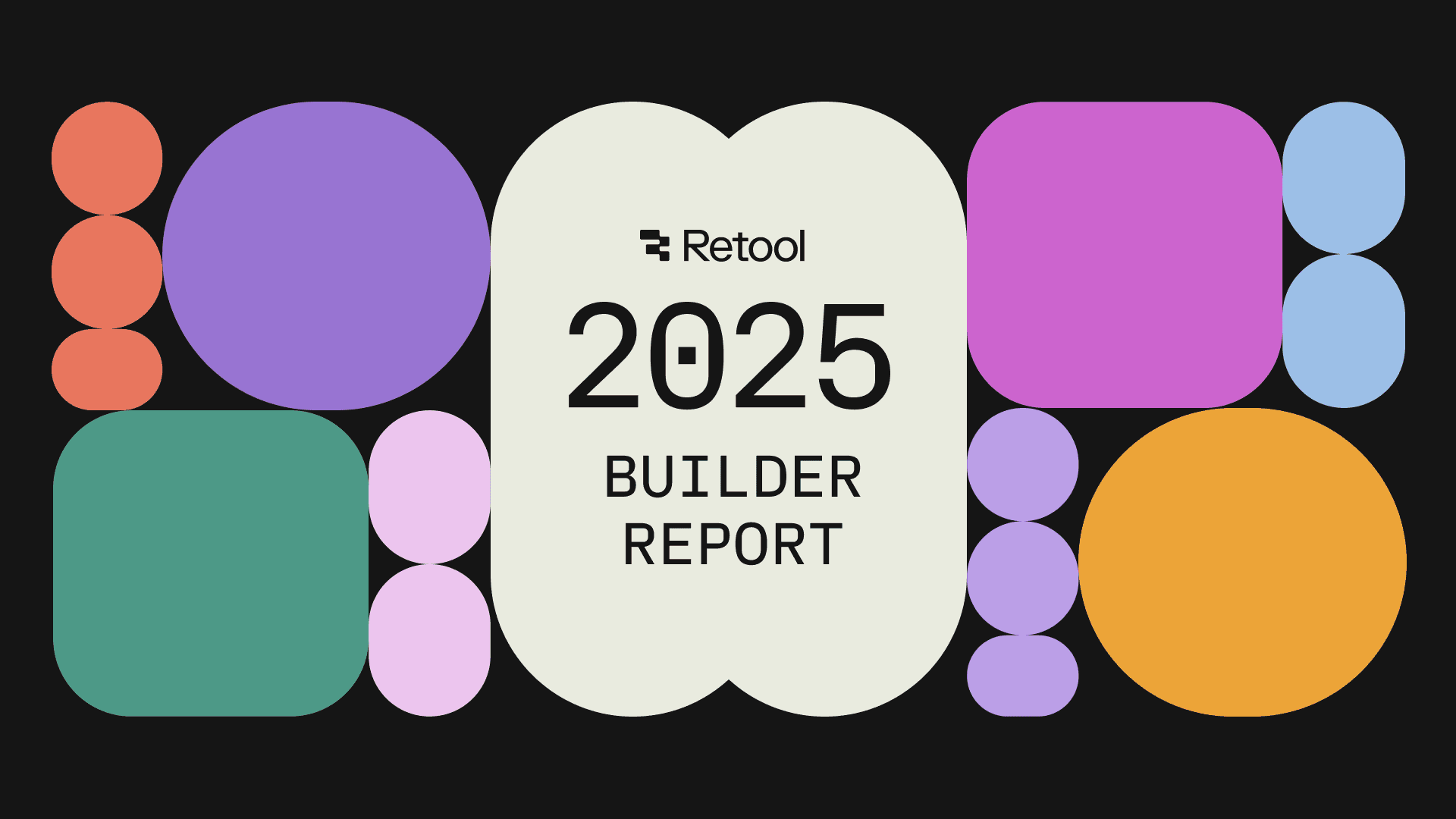At Retool Summit in San Francisco, we announced the world’s first enterprise application generation (AppGen) platform. Now, anyone can build applications with natural language. And for the first time—you can do this on your data (e.g. Postgres, Databricks, etc.), in your cloud (you can host Retool anywhere; it’s just a Docker image), and with security built in from day one (e.g. every button clicked in every Retool application is audited and saved).
This shift finally resolves a trade-off that’s defined enterprise software for decades: the speed of packaged tools versus the flexibility of custom code. Generative AI makes composing custom solutions faster and cheaper than implementing third-party software. But speed alone isn’t enough for the enterprise. The real potential is unlocked when AI generates directly on your data—understanding your schemas, APIs, and business logic—so outputs aren’t just quick, but instantly relevant and ready for production.
That’s what enterprise AppGen means to us: AI that creates apps and automations anchored in your enterprise context—your live data, your governance model, your security posture, and your deployment environment.
And that’s what today’s launch is about: bringing app and automation generation into the enterprise environment itself. For the first time, domain experts and engineering teams can build together on the same platform, against the same data, with the same guardrails. Not in disconnected sandboxes with toy tools, but side-by-side on real systems that matter.
With today’s new AppGen capabilities, Retool becomes the only platform designed to feel equally powerful for pro developers architecting enterprise systems and for business users solving problems—all in one place.
The first expression of enterprise AppGen is Assist, live now in public beta. Assist is a new tab in the Retool IDE that lets you create and modify software with natural language prompts.
Assist makes prompting a first-class way to build in Retool. What makes it powerful is Retool’s proximity to your data: production databases, private APIs behind VPNs, governed schemas, and the permissions wrapped around them. Because that context already lives inside Retool, generation never relies on brittle connectors or external handoffs—it happens where your enterprise data and governance already reside. The result is software that’s instantly relevant, secure, and ready to deploy.
This is how generation in Retool translates into production-grade reality:
- On your data. Connect directly to the databases, APIs, and services your business already runs on. Apps and automations generated with Retool are composed against your actual schemas—orders, customers, workflows—so they’re production-ready without rework.
- Secure by default. Every app automatically conforms to your org’s SSO, RBAC, and compliance policies because generation happens inside the same platform where governance is defined.
- Wherever you need us. Retool can run in our cloud or yours, so data never has to leave your stack. Sensitive information, access patterns, and controls stay inside your environment.
- Agentic and context aware. Assist doesn’t just output code snippets. It reasons over your app, calls tools inside Retool, takes multi-step actions, and asks for feedback and change approvals—just like a person would. With full knowledge of your schema, queries, and components, it builds alongside you, not in the abstract.
- Seamless deployment. Generated apps run on Retool’s managed runtime, deployable to production with one click—complete with hosting, versioning, and monitoring.
This is enterprise AppGen: AI creativity fused with the systems, data, and safeguards of the enterprise.

Enterprise AppGen only matters if what gets generated can survive in production. Retool has always been built for that reality.
Every app created in Retool inherits your org’s identity and access policies automatically: SSO, RBAC, audit trails, compliance frameworks. Our component library encodes good defaults into every interface. You get tables with pagination, filtering, and actions wired in by default. Integrations are consistent and permissioned, invoked the same way by every builder. Queries and schemas aren’t reinvented from scratch—they’re reusable building blocks that carry your business logic across apps.
That’s the foundation that makes Retool more than a prototyping tool. It’s what turns generation into durable software. And with today’s announcements, that foundation gets even stronger:
- Testing built in for reliability. Quality should scale with speed. With built-in testing, you can record tests by simply using your app, run them in real time, and integrate them into CI/CD, catching issues early without writing brittle scripts. Available in beta now.
- Reusable logic and shared libraries. Server-side functions let teams define backend logic once and reuse it everywhere. With libraries, that logic—plus components, modules, and agents—is discoverable and versioned across your org, so new projects start from proven building blocks. Coming soon.
- Data security that’s automatic. New data-level permissions enforce least privilege by default. Roles determine who can read or write sensitive data, and those rules follow users across every app and workflow, making security intrinsic instead of bolted on. Coming soon.
- Semantic objects for faster building. Semantic objects package data, permissions, and actions into reusable units so builders work with familiar concepts instead of raw queries. Governance and consistency come built in. Coming soon.
- Customer-hosted, Retool-managed deployments. You can now run Retool entirely within your infrastructure, hosted in your cloud and managed by us. Available in beta now.
Taken together, these capabilities reflect a simple truth: building fast only matters if what you build is safe to run. That’s why enterprise AppGen is designed for environments where governance isn’t optional—and why companies like Brex are already using it to move quickly without compromise.
“At Brex, speed and security aren’t trade-offs, they’re requirements,” said Camilla Matias, COO of Brex. “By adding AI that understands our actual data and security requirements, our teams can move at startup velocity while maintaining bank-grade governance.”
Faster development matters, but the deeper promise of enterprise AppGen is expanding who gets to build. For the first time, domain experts themselves are turning ideas into production-grade software.
Today, we released our 2025 Builder Report surveying more than 1,100 internal builders, which shows how dramatic this shift has already become. 91% say AI has changed how they work, and 66% report their organizations have already implemented AI productivity mandates. Nearly half of non-engineers now say they can build directly—and 80% say they can now go from problem identification to solution implementation without needing support from other teams. These aren’t developers in the traditional sense. They’re operations leaders, product managers, data analysts, and finance professionals who once relied on long engineering queues or manual workarounds.
That democratization is powerful, but it also sharpens the paradox facing every enterprise: move fast with ungoverned tools and hope nothing breaks, or slow down to preserve control while the market moves ahead. Retool resolves that tension. Generative AI provides the expressive leap from problem to solution, while the platform ensures consistency where it matters—authentication, permissions, schemas, integrations, and UI standards. Builders gain autonomy, IT retains trust.
The impact extends far beyond productivity. Over half of respondents (51%) say they’re solving problems in days or weeks instead of months or quarters. 65% of respondents say they’re now better able to meet or exceed leadership expectations; among those working under explicit AI mandates, that number climbs to 74%. That newfound autonomy is changing how people are perceived inside their companies: 46% are now recognized by leadership as someone who can “make things happen,” and 35% have become their org’s new “go-to” problem solvers. You can read the full report here.
“I used to have a freelancer that I would have to wait for weeks in between getting features implemented. Now with Retool's AppGen capabilities, I’m able to roll out pretty much anything I want on my own, with 10x speed,” said Joel MacPherson, CFO/COO of TrueOps.
The result is a fundamental shift in how organizations operate. Entire companies are discovering that, in the era of enterprise AppGen, they don’t just have more software—they have more builders.
The launch of Assist is just the first step. As we continue to build, Retool will be a platform defined by three principles: composable pieces, extensibility at every edge, and security by default. Together, they make app generation not just faster, but practical at enterprise scale.
That means every part of Retool—from queries to Workflows to Agents—can stand on its own or fit into larger systems. It means an ecosystem that grows with your needs, whether through connectors, custom components, or industry-specific integrations. And it means governance that’s present from the start, so adoption can scale without introducing new risk.
The impact for enterprises is straightforward: analysts will be able to move from questions to working dashboards in minutes instead of months. Operations teams will automate more of their processes without waiting on backlogged engineering resources. And ideas that once lingered on roadmaps will get into production more quickly, with guardrails already in place.
This is the foundation we’re building toward: a platform where more people can generate software, and enterprises can trust it from day one.
Assist is included in every plan, and free to use for a limited time. We want every builder to push the boundaries, experiment, and help us shape the next era of software—and if that’s the kind of work you love, we’re hiring.
Looking for the best place to get started?
- Check out new demo videos on building and editing your apps with Assist
- Review the quickstart guide for configuration steps and prompting best practices
The future of software is being generated in Retool. Sign up for free to see for yourself—we can’t wait to see what you’ll build.
Reader



